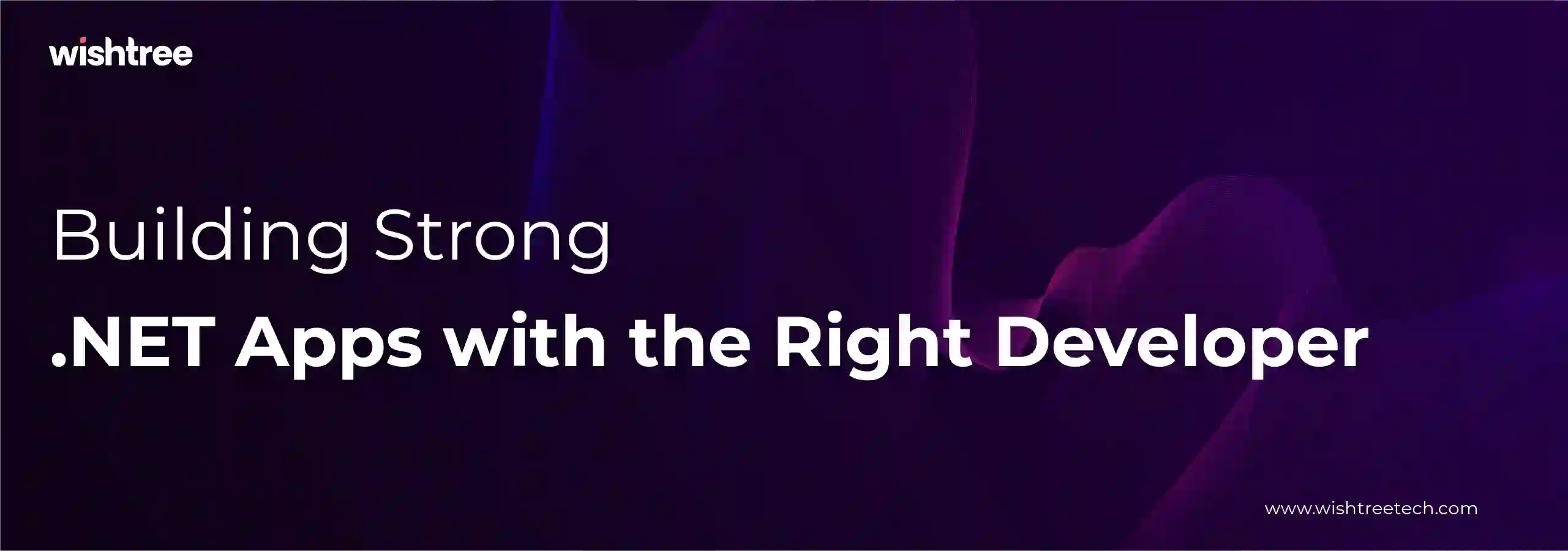Table of Contents
Java continues to be a cornerstone of enterprise application development even though the digital landscape keeps rapidly evolving. Its robustness, scalability, and security make it a top choice for businesses across industries. However, finding the right Java developer to bring your project to life can be a complex task.
This guide will equip you with the knowledge and strategies to identify and hire a skilled Java developer who can help you achieve your business objectives. From defining your project requirements to conducting technical interviews, we’ll delve into the key considerations to ensure you make the right choice.
With Wishtree Technologies, you can streamline your hiring process and find a dedicated Java developer who possesses the expertise, passion, and commitment to deliver exceptional results.
Why Hire a Dedicated Java Developer from Wishtree Technologies
Hiring a dedicated Java developer from Wishtree Technologies provides substantial cost savings. You avoid the financial burden of payroll taxes, employee benefits like health insurance and retirement plans, and the administrative overhead of managing in-house employees, such as onboarding, performance reviews, and leave management. By partnering with Wishtree Technologies, you streamline your budget and allocate resources more efficiently.
Define Your Project Needs
To hire the right Java developer, clearly define your project’s specific needs. Start with core functionalities, features, and the desired Java frameworks and libraries for your application.
Here are some key considerations:
- What core functions must your website or app fulfill?
- Are you looking for basic functionalities like user authentication, data persistence, and REST API development, or more complex features such as real-time data processing, machine learning integration, or microservices architecture?
- What features will improve your user experience and drive business goals for you?
- Do you have a preference for a specific Java framework like Spring Boot, Spring MVC, or Jakarta EE?
Check the Company’s Background
Before handing over your project to a Java development company, it’s crucial to delve into their background. Consider factors like their years of experience, the types of projects they’ve successfully delivered, their track record of achievements, and positive feedback from their clients.
Wishtree Technologies is a leading IT solutions provider specializing in Java development. With years of industry expertise, we have successfully completed a diverse range of projects, from small-scale websites to large-scale enterprise applications. Our team of skilled Java developers is proficient in frameworks like Spring Boot and Hibernate, enabling us to build high-performance, enterprise-grade applications in no time.
Wishtree Technologies connects clients with a global talent pool of highly skilled developers. Our teams are culturally adept, enabling seamless collaboration across borders.
With excellent English communication skills, our dedicated Java developers ensure clear and efficient communication throughout the project lifecycle. We are proud to serve a diverse clientele, including global organizations like the UN, World Bank, Coupa, and Xactly.
Conduct Technical Interviews for Java Developers
To ensure you hire the best dedicated Java developer, in-depth technical interviews are crucial. These interviews should rigorously assess the candidate’s knowledge of core Java concepts, object-oriented programming principles, design patterns, and problem-solving abilities.
Here are some key areas to focus on:
Core Java Fundamentals
- Test their understanding of Java’s core syntax, including variables, data types, operators, control flow statements, and functions.
- Evaluate their knowledge of OOP concepts such as classes, objects, inheritance, polymorphism, and encapsulation.
- Assess their ability to handle exceptions gracefully using try-catch-finally blocks.
- Test their understanding of threads, synchronization, and concurrent programming techniques.
Java Frameworks and Technologies
- Evaluate their proficiency in Spring Boot, Spring MVC, and Spring Data.
- Test their knowledge of ORM concepts and Hibernate’s features.
- For enterprise applications, assess their knowledge of Java EE technologies like Servlets, JSP, and EJB.
- If your architecture involves microservices, test their understanding of building and deploying microservices.
Problem-Solving and Data Structures and Algorithms
- Present algorithmic challenges involving sorting, searching, and graph traversal.
- Test their knowledge of data structures like arrays, linked lists, stacks, queues, trees, and graphs.
- Ask them to solve real-world problems using PHP, such as web application development or data processing.
Problem-Solving and Data Structures and Algorithms
- Present them with algorithmic challenges like sorting, searching, and graph traversal.
- Assess their understanding of fundamental data structures such as arrays, linked lists, stacks, queues, trees, and graphs.
- Ask them to solve real-world problems using Java, such as data processing, web application development, or system design.
Practical Skills
- Assess their code quality, including readability, structure, and commenting.
- Assess their skills in writing unit tests and debugging code effectively.
- Evaluate their knowledge of Git and its version control processes.
Choosing the Right Engagement Model: Full-Time, Part-Time, or Project-Based
Your choice of engagement model for a Java developer will greatly influence your project’s timeline, budget, and level of control. The three most common models are:
Full-Time Hire:
- Pros: Dedicated resource, Strong long-term commitment, Consistent performance
- Cons: Higher upfront costs, Longer hiring process, Potential long-term commitment
Part-Time Hire:
- Pros: Flexible staffing, Lower upfront costs, Access to specialized skills
- Cons: Potential scheduling conflicts, Less control over availability, Difficulty in building strong team dynamics
Project-Based Hire:
- Pros: Clear project scope and timeline, Cost-effective for short-term projects, Access to a wide pool of talent
- Cons: Potential lack of long-term commitment, Limited control over the developer’s workload, Potential for higher hourly rates
Time it Takes to Hire a Java Developer
The time required to hire a Java developer can fluctuate based on factors such as project complexity, necessary skills, and the chosen hiring process. A general timeline can provide a rough estimate. Here you go.
- Project Definition: Clearly define your project’s requirements, including functionalities, features, and the desired level of expertise. (1-2 weeks)
- Candidate Sourcing: Utilize job boards, social media, and professional networking platforms to identify potential candidates. Consider outsourcing to freelance platforms or partnering with an IT consulting firm. (1-4 weeks)
- Initial Screening: Review resumes to shortlist candidates based on their experience, skills, and cultural fit. Conduct initial phone or video interviews to assess their basic qualifications and communication skills. (1-2 weeks)
- Technical Evaluation: Conduct in-depth technical interviews to evaluate their Java programming skills, database management knowledge, and problem-solving abilities. Consider coding challenges or practical assignments to assess their practical skills. (1-2 weeks)
- Background Verification: Verify the candidate’s employment history, educational qualifications, and references. Conduct background checks to ensure their credibility and integrity. (1-2 weeks)
- Offer Negotiation and Onboarding: Once you’ve selected a candidate, negotiate the terms of employment, including salary, benefits, and start date. Complete the onboarding process, which may involve paperwork, training, and team introductions. (1-2 weeks)
And now we come to what hiring your dedicated Java developer from Wishtree Technologies truly means for your business.
Experience the Wishtree Advantage
- Hire top-tier developers in as little as 48 hours with our expedited hiring process.
- Enjoy a 100% risk-free 2-week trial to ensure they’re the perfect fit for your project.
- Get started today with our streamlined onboarding.
Important Factors to Consider When Hiring a Dedicated Java Developer
In addition to the points discussed above, here are some crucial factors to consider when hiring a dedicated Java developer:
Tech Stack Proficiency:
- Core Java: Ensure the developer has a strong foundation in core Java concepts, including object-oriented programming, design patterns, and exception handling.
- Java Frameworks: Proficiency in popular Java frameworks like Spring, Spring Boot, Hibernate, or Java EE can significantly accelerate development and improve code quality.
- Databases: Knowledge of relational databases like MySQL, PostgreSQL, and NoSQL databases like MongoDB is essential for data storage and retrieval.
- Version Control: Proficiency in Git or other version control systems is crucial for collaborative development and efficient code management.
Communication Skills:
- Effective Communication: Can articulate technical concepts clearly and concisely.
- Active Listening: Able to understand and respond to client requirements.
- Teamwork: Can collaborate effectively with other developers and stakeholders.
Problem-Solving Skills:
- Strong Analytical Skills: The ability to analyze complex problems, break them down into smaller, manageable steps, and develop effective solutions.
- Creative Problem-Solving: A knack for innovative and creative thinking, leading to efficient and elegant solutions.
- Excellent Debugging Skills: The ability to effectively identify, isolate, and resolve code errors quickly and efficiently.
Security Awareness:
- A strong understanding of security best practices, including knowledge of common vulnerabilities and how to mitigate them.
- The ability to write secure code that protects against common threats, such as SQL injection, cross-site scripting (XSS), and other vulnerabilities.
Experience Level: Matching Skills to Project Complexity
The level of experience required for a Java developer significantly impacts project success. This breakdown explores the suitability of different experience levels based on project needs.
Junior Developer:
- Advantages: Lower cost, high learning potential, and the ability to be mentored and shaped to fit specific project needs.
- Disadvantages: May require closer supervision, limited experience with complex tasks, and potentially longer task completion times.
Mid-Level Developer:
- Advantages: Solid understanding of PHP and frameworks, ability to handle complex tasks independently, and strong problem-solving and debugging skills.
- Disadvantages: May require guidance on high-level architectural decisions and have limited experience leading projects.
Senior Developer:
- Advantages: Extensive experience in PHP development, strong problem-solving and architectural skills, and the ability to lead teams and mentor junior developers.
- Disadvantages: Higher cost and may be less interested in performing routine or repetitive tasks.
Communication Skills
Strong communication skills are essential for the success of any software development project. A proficient Java developer must be able to:
- Requirement Understanding: Clearly comprehend project requirements, ask clarifying questions, and provide valuable feedback to ensure project alignment.
- Effective Communication: Express technical concepts in a clear, concise, and understandable manner, both verbally and in writing, to all stakeholders.
- Teamwork: Collaborate effectively with designers, project managers, and other developers to ensure smooth project execution.
- Project Updates: Provide regular and transparent updates to stakeholders on project progress, potential challenges, and proposed solutions.
- Active Listening & Feedback: Pay close attention to feedback and suggestions, and be open to constructive criticism to continuously improve.
Availability and Time Zone: Ensuring Seamless Collaboration
To ensure seamless collaboration and timely communication, it’s essential to consider the developer’s availability and time zone when hiring a Java developer.
- Overlapping Work Hours: To foster seamless communication and rapid problem-solving, ideally, the developer’s working hours should overlap with your team’s schedule.
- Time Zone Considerations: If significant time zone differences exist, establish clear communication channels (e.g., project management tools, instant messaging) and schedule regular meetings that accommodate all parties.
- Flexible Work Arrangements: Explore flexible work hours or remote work options to accommodate different time zones and improve work-life balance for all team members.
Hire a Dedicated Java Developer from Wishtree Technologies Today
Ready to elevate your Java projects? Contact us today for a free consultation and discover how Wishtree can connect you with top-tier talent. We will throw in a 100% risk-free 2-week trial for you too. Hurry!



